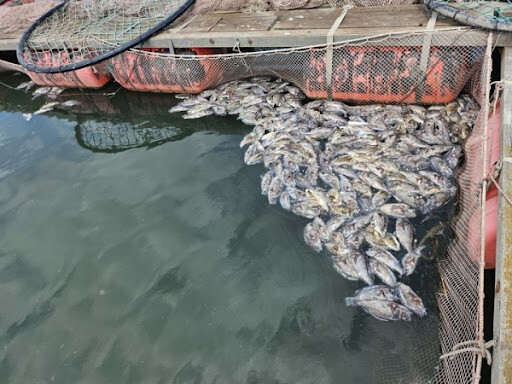
Jeju's waters are experiencing an earlier-than-usual inflow of high-temperature, low-salinity water, deepening the concerns of local fishermen. With some areas already seeing water temperatures approaching 30 degrees Celsius, there are growing fears of damage, including mass mortality of farmed fish. The Jeju Provincial Government has initiated a proactive emergency response system to minimize high-temperature damage.
On July 3, at 4:00 PM, the Jeju Ocean and Fisheries Research Institute issued a preliminary high-temperature warning for Jeju coastal waters and activated the "Caution" level of the heatwave (high-temperature) disaster alert. This warning is issued when sea temperatures reach or are expected to reach 25 degrees Celsius. This year, the warning was issued approximately 8 days earlier than last year, which was on July 11. As of 2:00 PM on July 7, water temperatures in Jeju Port and Marado soared to 29.7 degrees Celsius and 30.1 degrees Celsius, respectively. According to the National Institute of Fisheries Science, surface water temperatures in domestic coastal waters this summer are projected to be about 1.0 degree Celsius higher than the average year (25 degrees Celsius), indicating a high likelihood of more severe damage from high temperatures.
The Threat of High-Temperature, Low-Salinity Water: From Farmed Fish to Sessile Organisms
High-temperature, low-salinity water poses a serious threat to Jeju's marine ecosystem and fisheries. Last year, when Jeju's surface sea temperature soared to 30 degrees Celsius, there was significant damage, including mass mortality of farmed fish like flatfish in land-based aquaculture farms. High temperatures reduce the physiological activity of fish, weakening their immune systems, increasing disease incidence, and raising oxygen consumption, which can lead to a lack of dissolved oxygen. Land-based aquaculture farms are particularly vulnerable to rising temperatures, incurring additional costs such as increasing water circulation to lower temperatures or enhancing oxygen supply.
Low-salinity water is also a major problem. When hot, low-salinity water flows into communal fishing grounds, sessile organisms like abalone and conch die due to impaired osmotic regulation. Low-salinity water primarily originates from freshwater discharged from China's Yangtze River, which is carried by ocean currents. Last year, on July 30, low-salinity water of approximately 25 psu (practical salinity units) was observed about 30 miles southwest of Jeju, and by August 8, it had entered within 5 miles of the Jeju coast, triggering a response phase. The average salinity of the ocean is about 34 psu, meaning low-salinity water can be fatal to marine life.
Jeju Province's Proactive Response and Enhanced Fishermen Support Measures
Jeju Province is making an all-out effort to minimize damage from high-temperature, low-salinity water and proactively prevent harm to fishermen.
Strengthening Marine Observation Systems: Upon the activation of the high-temperature preliminary warning, the Ocean and Fisheries Research Institute immediately strengthened its marine observation system. From that day, the area up to 30 miles (approximately 54 km) southwest of Jeju was designated as a concentrated observation area, with a focus on monitoring water temperature and salinity from the Yangtze River outflow. Furthermore, continuous monitoring is being conducted through a self-developed real-time water temperature and salinity prediction system. Starting this year, observation equipment has been installed near western communal fishing grounds where high-temperature and low-salinity water inflow is expected, establishing a real-time observation system from the coast to the communal fishing grounds. This is expected to play a crucial role in predicting and preventing damage before it occurs.
Operating High-Temperature Response Situation Room and On-site Support: Jeju Province operates a "High-Temperature Response Situation Room" to minimize damage to aquaculture farms and strengthen proactive response. The situation room oversees damage reports, on-site investigations, and situation reporting, serving as a control tower for rapid response. Additionally, response equipment such as liquid oxygen and immune boosters are pre-supplied to aquaculture farms in the province to help increase fish survival rates and suppress disease outbreaks.
Disaster Insurance Support and Information Provision: To reduce the burden on aquaculture disaster insurance subscribers, 60% of the self-payment amount is supported by the provincial budget. This is a practical support measure that helps fishermen confidently subscribe to disaster insurance and receive compensation for economic losses in case of damage. Moreover, real-time water temperature information is constantly provided to fishermen via text messages and the website through the water temperature observation network, enabling them to quickly check information and respond.
Expert Collaboration and On-site Guidance: The Jeju Fish Farming Cooperative and the National Federation of Fisheries Cooperatives are participating in the on-site support team, providing assistance with response equipment, collecting dead fish, and sharing disaster insurance information. Furthermore, the National Institute of Fisheries Science's Subtropical Fisheries Research Institute and the Ocean and Fisheries Research Institute are responsible for water temperature analysis, forecasting, and on-site guidance for aquaculture farm management, providing practical assistance to fishermen based on their professional knowledge.
Oh Sang-pil, Director of the Jeju Provincial Government's Ocean and Fisheries Bureau, stated, "Now is the golden time for high-temperature response, so we will further solidify organic cooperation among related agencies to strengthen on-site response capabilities." Jeju Province plans to continue ongoing monitoring and rapid response to minimize high-temperature and low-salinity water damage.
The threat of high-temperature, low-salinity water in Jeju's seas highlights the seriousness of marine environmental changes due to climate change. Jeju Province's proactive and multi-faceted response efforts to these threats will play a crucial role in protecting the lives of fishermen and Jeju's marine ecosystem. Moving forward, the government, local authorities, and fishermen must work together to effectively counter these natural disasters.
[Copyright (c) Global Economic Times. All Rights Reserved.]




























